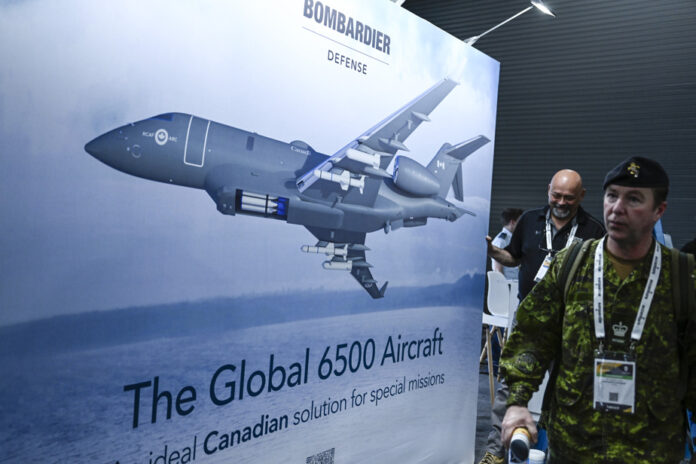Quebec and Ontario are pressuring the Trudeau government by urging it to put in place a call for tenders to replace its aging maritime patrol planes. The two provinces believe that Bombardier, well established at home, should have the right to compete with Boeing.
As part of the Council of the Federation, which is taking place in Winnipeg, Manitoba, Premier François Legault has put his cards on the table. With his Ontario counterpart Doug Ford, he wants this file to be on the agenda of the event bringing together the premiers of the provinces and territories.
“We don’t see why, given the thousands of jobs and the (economic) spinoffs, the federal government wouldn’t let Bombardier bid on the contract,” Legault said Monday in a scrum.
The replacement of the Royal Canadian Air Force’s (RCAF) 14 aging CP-140 Auroras – a contract worth up to $9 billion in aggregate – has become a political issue.
Bombardier is asking for a chance to offer a modified version of its Global 6500 private jet, but the Ministry of Defense is not keen on buying them. Boeing’s Poseidon P-8A, an aircraft akin to the 737 family of aircraft that can launch torpedoes, has been identified as the only aircraft that can meet Canadian requirements.
For several months, the private jet manufacturer, which is also on the hunt for military contracts, has been going out of its way to convince Ottawa to change its tune. It has partnered with General Dynamics to equip the modified version of the Global 6500 with sensors and systems designed by this American defense giant. The two partners ensure that the device will be ready for 2030, the year in which the CP-140s will begin to be scrapped.
“It seems that the federal government is thinking of giving the contract to Boeing without a tender when Bombardier can offer the adjusted Global 6500, in just a few years, to be able to offer an aircraft at least as good as Boeing’s , said Mr. Legault. When you look at federal planning, there are a few years available. »
According to information released on June 27 by an agency of the United States Department of Defense, the price of 16 P-8A Poseidons that Boeing aims to sell in Canada amounts to 5.9 billion US dollars. Although this seems to work in favor of the American aircraft manufacturer, the Trudeau government repeats that these details do not mean that a purchase contract has been concluded and that its options analysis is continuing.
Bombardier claims to be able to offer a “competitive” price to that of its rival. Impossible, however, to have more details for the moment. The Quebec multinational argues that it is through a call for tenders that it would be able to offer more details.
“There would have to be specific requirements,” said the aircraft manufacturer’s vice president of public affairs, Pierre Pyun, as part of a presentation with reporters last week.
As part of its offensive, Bombardier has commissioned a study from PwC to assess the economic benefits to the country if it succeeds in winning the contract to replace the CP-140s. Thus, this would add 2.8 billion to the gross domestic product in addition to supporting 22,650 jobs and generating 800 million in tax revenue over the duration of the program.
Boeing had also lent itself to the exercise by distributing, at the end of May, a study carried out by the firm Doyletech. The American giant would support more than 2,900 jobs annually in addition to supporting 358 million in production in the country if Ottawa opts for the Poseidon.





